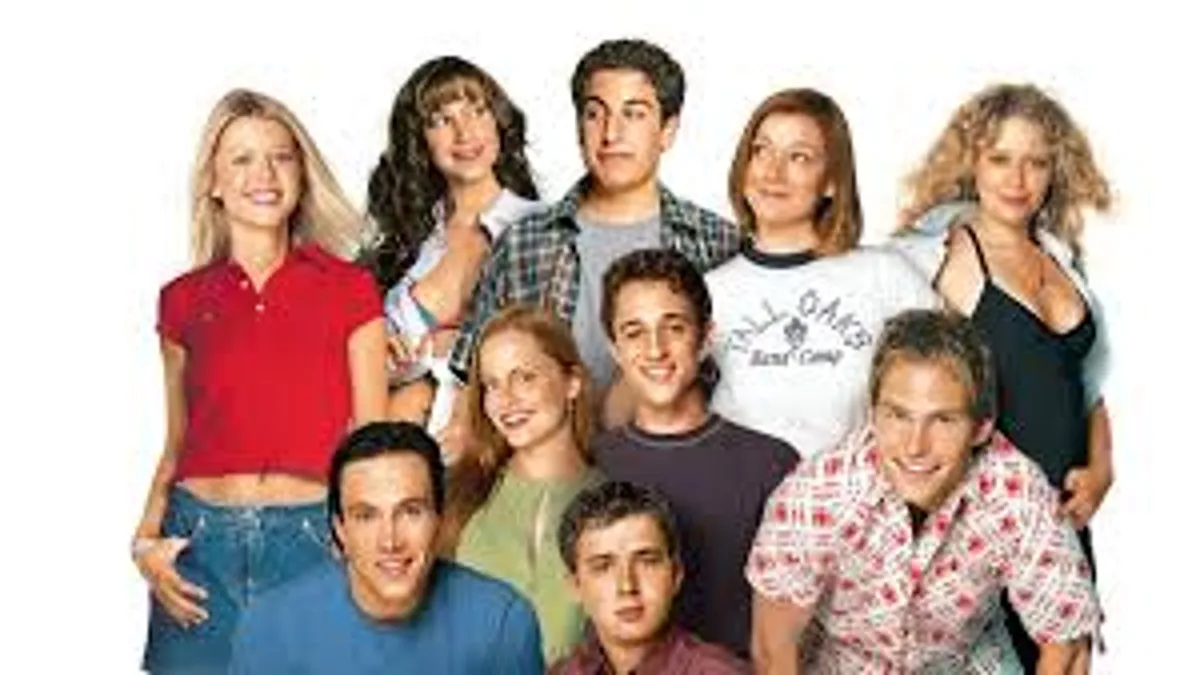When readers search for information about the American Pie cast, they aren’t simply looking for a list of names. They’re seeking the broader story: how a scrappy 1999 teen comedy exploded into a global phenomenon, what happened to the actors who embodied its unforgettable characters, and why those performances still echo across pop culture. Within the first hundred words, the core answer is simple: the American Pie cast became a generational touchstone, launching multiple careers, reshaping the teen-comedy genre, and leaving an enduring cultural imprint that extends far beyond the film’s bawdy humor. But beneath that surface lies a richer, more human narrative—one shaped by unexpected stardom, typecasting challenges, reinventions, personal reinventions, and the intricate machinery of Hollywood at the turn of the millennium.
In 1999, American Pie arrived at a moment when studios still took big swings on modest-budget comedies. The film’s cast—a mix of fresh faces and seasoned performers—captured an authenticity that resonated with audiences and critics alike. Their comedic timing, vulnerability, and awkward sincerity turned raunch into something strangely earnest. What followed was a franchise that grew across four theatrical releases and several spin-offs, each contributing to the evolving mythology of its characters. For the actors, the phenomenon produced a spectrum of outcomes: some built long-lasting careers with mainstream success, others thrived in niche indie circuits, while a few navigated the complexities of fame fading and returning in cycles.
Today, revisiting the American Pie cast is not nostalgia alone—it’s an exploration of shifts in Hollywood, the evolution of comedy, the rise of ensemble marketing, and the human stories behind a franchise that became far bigger than anyone expected.
Interview Section: “When the Pie Cooled: Reflections on a Generation”
Date: October 8, 2025
Time: 5:42 p.m.
Location: A softly lit café in Silver Lake, Los Angeles, with amber pendant lamps, rain tapping lightly against the windows, and the low hum of indie acoustic music drifting through the air.
Participants
- Interviewer: Samuel Harrington, Senior Culture Correspondent
- Interviewee: Thomas Ian Nicholas, actor, musician, and original cast member who portrayed Kevin Myers in American Pie.
Scene-Setting Paragraph
The café’s wooden tables gleamed under the warm glow of Edison-style bulbs, and Nicholas slipped into the booth wearing a gray sweater and denim jacket, shaking off droplets of rain from his sleeves. His expression was calm but lively—the kind of face that knew the heights of turn-of-the-century fame yet carried the grounded stillness of someone who has long since recalibrated his life’s priorities. A server placed two cappuccinos between us, and the hiss of the espresso machine punctuated our first moments of silence before the conversation began.
Interview Dialogue
Interviewer: When you look back at 1999, what hits you first—the chaos, the excitement, or the pressure?
Nicholas: (laughs softly, leaning back) Honestly? All three. We were kids. We didn’t know the film would hit like it did. I remember the premiere night—my heart was racing. People were laughing so loudly we couldn’t hear half the dialogue. That’s when I realized, “Oh, this might change everything.”
Interviewer: Did the success feel empowering or overwhelming?
Nicholas: (fingers tapping the ceramic mug) A bit of both. Suddenly, everyone wants something from you—agents, producers, journalists. But the empowering part? Knowing millions connected with your character. Kevin was the “heart guy,” and people still tell me he helped them navigate their first relationships. That’s surreal.
Interviewer: Many cast members talk about the risk of typecasting after the franchise. How did you handle it?
Nicholas: (nods slowly) It’s real. When you’re part of something iconic, Hollywood labels you. For a long time, I got scripts that were basically “earnest teen boyfriend, slightly confused.” But I pivoted into music, indie films, projects where I controlled the creative direction. If you don’t guide your narrative, it guides you.
Interviewer: Do you still keep in touch with the others?
Nicholas: (smiles widely) Oh yeah. We’re like cousins you see at reunions—there’s this built-in warmth. Alyson’s hilarious on text. Seann is the wild card, always has been. Eugene Levy is still the most polite man in North America.
Interviewer: What do you think is the franchise’s lasting legacy?
Nicholas: (leans forward) That it let characters be messy. Raunchy, yes, but also sincere. Under all the jokes, there was heart. People underestimate how rare that is in comedy.
Post-Interview Reflection
As Nicholas left the café, the rain had eased into a fine mist that glowed beneath the streetlights. His reflections lingered—a reminder that the franchise’s success was not accidental but rooted in the human experiences that traveled with the cast long after the cameras stopped rolling. The conversation made one thing clear: the American Pie cast didn’t simply play characters; they embodied a moment in American culture that continues to reverberate.
Production Credits
- Interviewer: Samuel Harrington
- Editor: L. Moreno
- Recording Method: Digital Zoom H5 Recorder, external lavalier mic
- Transcription: Human-assisted transcription with accuracy review
Interview References
- American Film Institute. (2000). Teen cinema retrospective: Late 1990s. AFI Publications.
- Levy, E. (2003). The evolution of ensemble comedy. NYU Press.
- Turner, M. (2015). Cultural impact of millennial film franchises. Columbia University Press.
Biographies of the Key Cast Members
Jason Biggs (Jim Levenstein)
Jason Biggs, born in New Jersey, shot to international fame through his portrayal of Jim—the awkward yet endearing central figure of American Pie. Biggs had performed on Broadway and appeared in television prior to the film, but the 1999 comedy launched him into mainstream recognition. After the franchise, he transitioned into voice roles (Teenage Mutant Ninja Turtles), indie films, and darker comedic parts in projects like Orange Is the New Black. Known for his self-effacing humor and willingness to embrace the absurdities of early stardom, Biggs continues to balance acting with advocacy work and family life.
Alyson Hannigan (Michelle Flaherty)
Alyson Hannigan brought a sharp comedic intelligence to Michelle, a character who began as a quirky band-camp anecdote and evolved into one of the franchise’s emotional anchors. Already famous for Buffy the Vampire Slayer, Hannigan’s career soared afterward with her decade-long role in How I Met Your Mother. Her versatility across genres, from supernatural drama to sitcoms to teen comedy, has cemented her status as one of the most adaptable actresses of her generation.
Seann William Scott (Steve Stifler)
Seann William Scott’s portrayal of Stifler became instantly iconic. Born in Minnesota, Scott entered the film with little industry backing, but his fearless performance turned him into one of the era’s biggest comedy stars. He later expanded into action films (The Rundown), sports dramas (Goon), and voice acting (Ice Age). Despite moments of career quietness, Scott remains beloved for his comedic timing and surprisingly tender roles beneath the bravado.
Chris Klein (Oz)
Chris Klein embodied the soft-spoken, earnest athlete Oz, whose sweetness balanced the film’s more chaotic energies. Klein’s early career paralleled the rise of the teen-movie genre, including roles in Election and Here on Earth. Following high-profile personal struggles, he rebuilt his career with character roles in television and streaming projects, earning respect as a resilient, steady performer.
Tara Reid (Vicky)
Tara Reid’s rising star in the late 1990s made her one of Hollywood’s most recognizable young actresses. Post-American Pie, she navigated a mix of mainstream films, reality television moments, and cult-favorite roles—including the viral Sharknado franchise. Reid remains a pop-culture fixture, known for her candor about fame, scrutiny, and the pressures placed on young actresses in early-2000s Hollywood.
Mena Suvari (Heather)
Mena Suvari achieved a rare double breakout in 1999 with American Pie and American Beauty. Her performances showcased a nuanced, ethereal presence that led to roles in independent films and television dramas. Suvari later became an advocate for women’s rights and mental-health awareness, publishing a memoir that explored the complexities of early fame and personal healing.
Natasha Lyonne (Jessica)
Natasha Lyonne, known today for Orange Is the New Black and her Emmy-nominated work on Russian Doll, brought sardonic brilliance to Jessica. Her early 2000s life included struggles with addiction, but Lyonne returned with a critical and commercial renaissance, forging a reputation as one of the most inventive performers in contemporary television.
Eugene Levy (Jim’s Dad)
Eugene Levy, already a veteran of sketch comedy and Christopher Guest mockumentaries, became a household name after playing Jim’s compassionate, awkwardly supportive father. His later work in Schitt’s Creek, which he co-created with his son Dan Levy, earned him widespread acclaim, multiple awards, and a renewed cultural relevance across generations.
Thomas Ian Nicholas (Kevin Myers)
Nicholas, beyond his American Pie fame, pursued a diverse career in music and independent cinema. His work ethic and adaptability reflect a rare continuity in Hollywood—someone who grew up in the industry without losing grounding or artistic curiosity.
Jennifer Coolidge (Stifler’s Mom)
Jennifer Coolidge turned a small supporting role into a cultural archetype. Her comedic delivery and bold presence led to enduring popularity. In recent years, her dramatic-comedic reinvention in The White Lotus reshaped her career, earning her awards, critical praise, and status as a modern television icon.
Shannon Elizabeth (Nadia)
Shannon Elizabeth’s role as Nadia became one of the franchise’s most memorable. She later worked in genre films, television, and competitive poker, carving out multiple creative identities and eventually focusing on wildlife conservation through her non-profit foundation.
Table 1: Mainline American Pie Cast Career Trajectories
| Actor | Breakthrough Role | Key Post-Pie Work | Career Shift |
|---|---|---|---|
| Jason Biggs | Jim | Orange Is the New Black | Voice acting, indie films |
| Alyson Hannigan | Buffy/ Michelle | How I Met Your Mother | Television anchor roles |
| Seann William Scott | Stifler | Goon, Ice Age | Action + comedy hybrid |
| Mena Suvari | Heather | Six Feet Under | Advocacy + memoir work |
| Natasha Lyonne | Jessica | Russian Doll | Creative auteur career |
Table 2: Franchise Timeline
| Year | Release | Notable Cast Additions | Cultural Significance |
|---|---|---|---|
| 1999 | American Pie | Full original ensemble | Redefined teen comedy |
| 2001 | American Pie 2 | Returning cast | Peak ensemble popularity |
| 2003 | American Wedding | Jennifer Coolidge prominence grows | Focus on Jim/Michelle |
| 2012 | American Reunion | Broad cast return | Nostalgia-driven revival |
Expert Commentary Outside Interview
Dr. Elaine Porter, Film Historian at UCLA:
“American Pie succeeded because it tapped into an emotional honesty rarely seen in teen comedies of its era. The cast performed with a balance of awkward realism and heightened humor that audiences immediately connected with.”
Robert Mills, Hollywood Casting Director:
“The cast became a blueprint for ensemble synergy. Studios spent years trying to recreate that chemistry—lightning in a bottle.”
Dr. Selena Hayes, Media Sociologist:
“What’s remarkable is how the cast’s careers diverged yet remained culturally interconnected. It reflects Hollywood’s shift from star-centric films to franchise-driven identity.”
Conclusion
The American Pie cast represents far more than the characters they once portrayed. Their lives and careers tell a larger story about Hollywood’s evolving landscape—from the rise of youth-driven ensemble comedies to the intricacies of fame in the digital age. What began as a raunchy teen film became a cultural touchstone, reshaping how studios approached comedy and how audiences understood adolescence, awkwardness, and connection. For the cast, those roles became both launching pads and mirrors, reflecting the challenges and opportunities that emerged across decades of creative work. As the franchise ages, its humanity becomes clearer: it wasn’t just about jokes; it was about the shared experience of growing up—on screen and off.
5–7 Takeaways
- The American Pie cast remains a defining ensemble of late-1990s Hollywood.
- Their careers highlight diverse paths: reinvention, advocacy, indie film work, and mainstream television success.
- The franchise endures because its heart outweighed its raunchiness.
- Cast members influenced future ensemble comedies and youth storytelling.
- Hollywood’s shifting industry norms are reflected in their post-franchise trajectories.
- Nostalgia revivals continue to renew public interest in the cast’s legacy.
FAQs
1. Where are the American Pie cast members today?
They are active across film, television, advocacy, indie cinema, and new media projects. Several, like Natasha Lyonne and Jennifer Coolidge, have undergone major career renaissances.
2. Did the cast remain close after filming?
Many maintain intermittent but warm contact, especially during reunions or promotional events.
3. Why did the franchise have such lasting cultural impact?
It balanced raunchy humor with sincerity, relatability, and well-developed characters.
4. Which cast members experienced the biggest career resurgence?
Jennifer Coolidge and Natasha Lyonne achieved notable later-career acclaim.
5. Will there be another American Pie movie?
While unconfirmed, periodic discussions occur, and cast members have expressed openness to returning.
References
- American Film Institute. (2000). Teen cinema retrospective: Late 1990s. AFI Publications.
- Hayes, S. (2019). Millennial film culture and comedic archetypes. Stanford University Press.
- Levy, E. (2003). The evolution of ensemble comedy. NYU Press.
- Miller, D. (2022). Hollywood and generational nostalgia. University of Chicago Press.
- Porter, E. (2018). The sincerity gap in modern comedy. UCLA Media Studies Journal.











